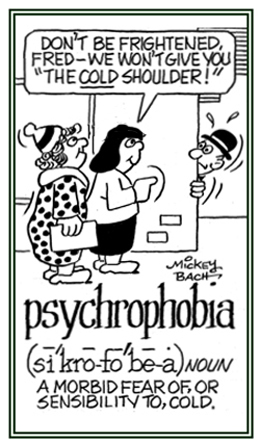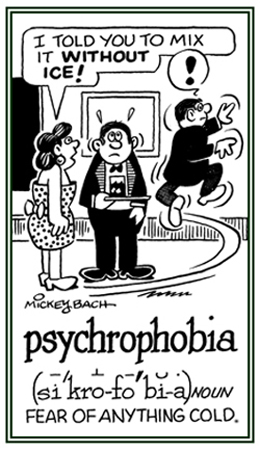psychro-, psychr-
(Greek: cold)
The testing of tactile (touch) and other forms of sensibility: Dr. Jones, the neurologist, ran a series of esthesioscopies to try to determine the cause of the difficulty Iva was experiencing while tasting and smelling foods.
psychric (adjective), more psychric, nost psychric
Pertaining to low temperatures or cold habitats: Mr. Smith told his students to make a list of psychric areas in the world where ice and snow existed throughout the year.
A painful sensation of cold: Psychroalgia can be a morbid state characterized by an agonizing and subjective feeling of being cold.
psychrocleistogamic (adjective), more psychrocleistogamic, most psychrocleistogamic
A reference to plants in which self-pollination takes place within flowers that remain closed because of abnormally cold conditions: Some types ov vegetation in cold climates are psychrocleistogamic in that they rely on fertilising themselves for reproduction and not by insects or wind.
1. The perception of feeling cold even though the body is warm: Even though Jim was wearing a heavy winter coat and ear muffs, he was experiencing psychroesthesia and could not get warm.
2. A subjective sensation of coldness in a part of the body that feels warm to the touch: Irene experienced psychroesthesia in her feet even though she was wearing heavy socks.
2. A subjective sensation of coldness in a part of the body that feels warm to the touch: Irene experienced psychroesthesia in her feet even though she was wearing heavy socks.
A psychroesthesia ran up Lorna's back like a cold chill when she heard an eerie sound up in the attic.
Growth behavior influenced by low temperatures: It has been noted that psychrokliny has an impact on plants causing stress on functional adaptation when there is a temperature change,
Bathing in cold water: In some countries, psychrolus takes place on the first of January each year for those who are very courageous to take a quick swim in in the town's lake or river.
A device for measuring app the humidity of the atmosphere by the difference in temperature between two thermometers: A psychrometer keeps the bulb of one thermometer to stay moist, the other one dry. Evaporation from the moist bulb lowers the reading of that thermometer and the greater the difference in readings, the drier the air. No difference indicates 100% relative humidity.
The study of the physical laws that influence air and water mixture: In the science of psychrometry, the calculation of relative humidity and water vapor pressures from wet and dry bulb temperatures and barometric pressure; whereas relative humidity is the value ordinarily employed, the vapor pressure is the measurement of physiological significance.
An organism that grows best at a low temperature: A psychrophil is a form of life that thrives best from 0° to 32° C (32° to 86° F) with optimum growth occurring at 15° to 20° C (59° to 68° F). °
psychrophilic (adjective), more psychrophilic, most psychrophilic
In biology, pertaining to an organism thriving at low temperatures: Psychrophilic bacteria are extremophilic and are capable of growth at very low temperatures of 0° C to 15° C, or even best at 15° C to 20° C.
1. An abnormal dread of cold conditions, such as cold weather: Helen really hated to go to school during winter because of her psychrophobia.

© ALL rights are reserved.

© ALL rights are reserved.
Go to this Word A Day Revisited Index
People who have psychrophobia tend to keep their houses very warm, overdress, and avoid eating or drinking things that are cold or have crushed ice or ice cubes.
2. An excessive aversion or sensitiveness to anything that is cold: The symptoms of psychrophobia can include extreme anxiety, dread and anything associated with panic, such as shortness of breath, rapid breathing, irregular heartbeat, immoderate sweating, and shaking.Sam's psychrophobia always prevented him from accepting any drinks with ice cubes in them.
3. Etymology: from Greek psychr-, "cold" + -phobia, "fear, dread."

Go to this Word A Day Revisited Index
so you can see more of Mickey Bach's cartoons.
psychrophobic (adjective), more psychrophobic, most psychrophobic
1. A reference to an extreme sensitiveness to cold: James was very psychrophobic in that he wouldn't go outside in winter because of the icy temperatures and the fear of falling on ice!
2. Descriptive of a morbid dread of cold: Ginny, being psychrophobic, came from a place with a very warm climate and couldn't stand the freezing temperatures and bitter icy wind when visiting her relatives in Canada during the winter!
2. Descriptive of a morbid dread of cold: Ginny, being psychrophobic, came from a place with a very warm climate and couldn't stand the freezing temperatures and bitter icy wind when visiting her relatives in Canada during the winter!
A double catheter through which cold water is circulated to apply cold to the urethra or another canal or cavity: At hospital, DR. Lawson explained to Mrs. Lance that a psychrophore would be used in order to correct the disorder that she was experiencing in her urinary tract.
A plant living in relatively cold polar or alpine habitats or on a cold substratum: Mr. Edwards told his students to find at least 10 types of vegetation that were psychrophytes, or those plants that thrived in Arctic regions.
Cross references of word families that are related directly or indirectly to "winter, freezing, frost, and/or cold": algid- (cold, chilly); cheimo-, chimo- (winter, cold); crymo-, krymo- (cold, chill, frost); cryo-, kryo-; (cold, freezing); frigo-, frig- (cold, frost); gel-, gelati- (freeze, frost, congeal); hiber- (winter, wintry); pago- (cold, freezing); rhigo- (cold, frost; shiver).
Showing page 1 out of 2 pages of 17 main-word entries or main-word-entry groups.

